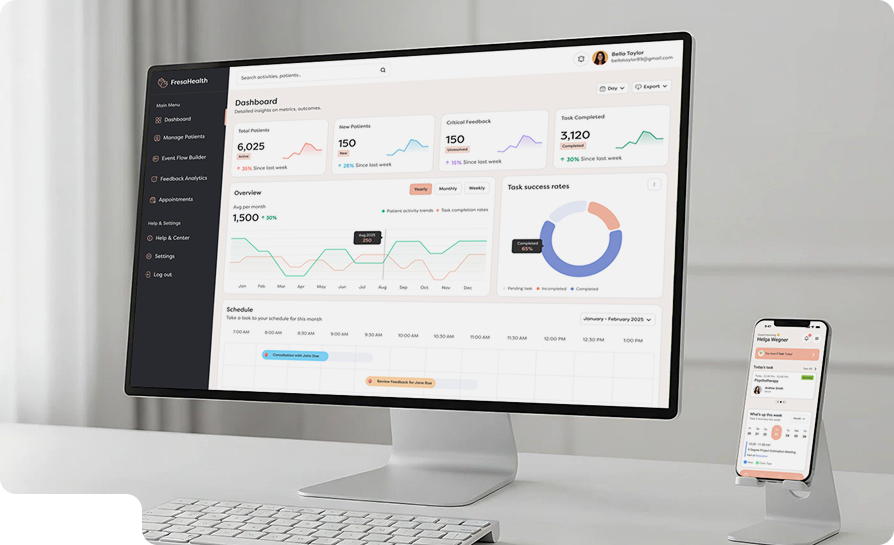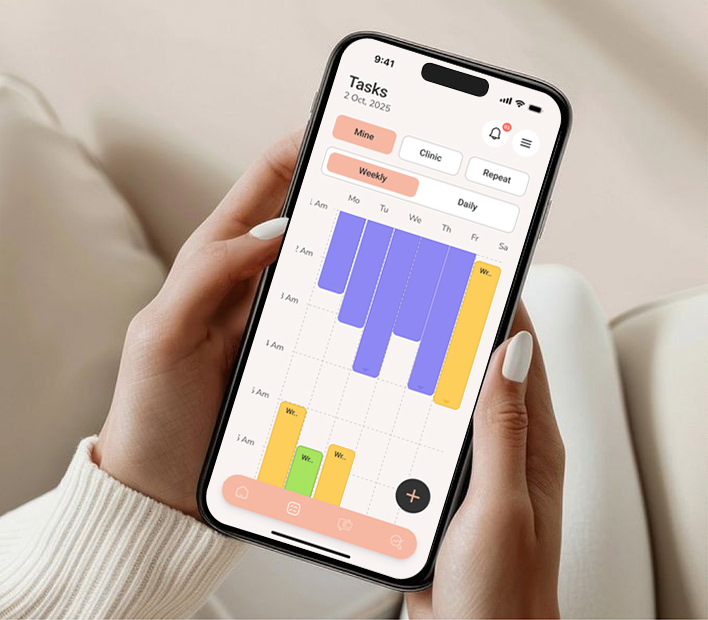
Ai Cases For
FresaHealth

Table Of Contents
Patient-Centric Rehabilitation with Doctor-in-the-Loop and AI designed by Questa Solutions
Executive Summary
Re-hospitalization due to lack of timely Patient Rehabilitation and low Treatment Adherence at home is a $92 Billion problem worldwide. Fresa Health is at the forefront of transforming rehabilitation care through a patient-centric approach, integrating healthcare providers with advanced Artificial Intelligence to care for patients remotely, create custom treatment pathways. Their model focuses on enabling patients to recover effectively at home, supported remotely by medical professionals and intelligent systems that create personalized journeys within therapeutic boundaries. Thousands of patients rely on this digital rehabilitation for mental health, orthopaedic and cardiac wellness.
This case study explores the critical need for such innovative solutions, the specifics of Fresa Health's offering that Questa built, and the robust regulatory framework that underpins its quality and trustworthiness.
Business Problem: The Economic and Patient Experience Burden due to lack of Complete Rehabilitation
Traditional rehabilitation programs often face significant challenges, leading to suboptimal patient outcomes and substantial economic burdens on healthcare systems. A key issue is the high rate and cost of rehospitalization, which places immense strain on resources across Europe and globally.
Market research data consistently highlights the fiscal impact of rehospitalizations. For instance, a 16-year nationwide study in Portugal focusing on inflammatory bowel disease (IBD) revealed that 33% of IBD-related hospitalizations were rehospitalizations. The mean IBD-related rehospitalization charges escalated from €14,589 per hospitalization-year in 2000 to €17,548 in 2015, with total annual rehospitalization costs reaching €3.1 million by 2015 for IBD alone [1].
In Germany, psychiatric inpatient care remains a major component of treatment for mental disorders, though there has been development of outpatient, day‐hospital, and community psychiatric services but still not enough remote rehabilitation services.

.jpg)
One study observed that from 1991 to 2010,—while the number of psychiatric beds decreased and average length of stay dropped (from ~65 days to ~23 days), the number of people receiving inpatient psychiatric care almost doubled. Over a similar period, the rehospitalization rate rose leading to almost €29 Billion additional re-hospitalization costs.
Beyond the financial aspect, current rehabilitation models often leave patients feeling unsupported, overwhelm doctors with excessive requests, and frequently result in incomplete recoveries. Fresa Health identifies these critical gaps:
9% of patients conduct digital therapy alone, indicating a lack of engagement or support.
600 requests for help per doctor per month, highlighting an unsustainable workload for healthcare providers.
77% higher risk of disease relapse without full recovery, underscoring the ineffectiveness of existing programs.
These statistics demonstrate a clear need for more efficient, supportive, and patient-adherent rehabilitation solutions.
Scaling and Integration with Partners
Extensible Architecture: Recommendation endpoints and monitoring APIs were built for future integration with partner dashboards and ML-Ops pipelines.
Partner Enablement: Technical integration documents and 3–5 video tutorials were produced for partner DevOps teams to enable self-service deployment.
Scaling and Integration with Partners
1. Cloud Integrations :
The system was designed with plug-and-play compatibility for leading cloud GPU providers — AWS, Google Cloud, Azure, and G-Core — enabling future API-based optimization and cross-provider benchmarking.
2. Extensible Architecture:
Recommendation endpoints and monitoring APIs were built for future integration with partner dashboards and ML-Ops pipelines.
3. Marketing& Growth Ecosystem:
Questa Solutions implemented a data-driven marketing funnel with lead nurturing automation, email scoring, and event tracking via Brevo and Google Analytics 4.
4. Partner Enablement:
Technical integration documents and 3–5 video tutorials were produced for partner DevOps teams to enable self-service deployment.
Architecture Overview
- Frontend (React.js), Backend (Node.js + FastAPI)
- Authentication Module
- Inference Matching (ONNX import)
- Onboarding Widget
- Recommendation Engine (Python)
- Dashboard Visualization| Alerting & Reporting (CMS API)
- Cloud Infrastructure Layer
- (Terraform + AWS/GCP/Azure Integration)
- Data Layer: PostgreSQL, Redis Cache, and Cloud Storage
Technical Architecture
Key Components
Recommendation Engine : Python-based inference profiling tool analysing GPU workload efficiency and suggesting optimal configurations.
Monitoring System : Continuous model performance tracking with alert thresholds for cost and latency drift.
Monitoring System : Continuous model performance tracking with alert thresholds for cost and latency drift.
Email Integration : Brevo API for automated notifications, performance reports, and marketing automation.
Security and User Management : Encrypted authentication system with social login support, role-based permissions, and password recovery.
DevOps Deployment Scripts : Terraform templates for cloud provisioning and model deployment automation.



